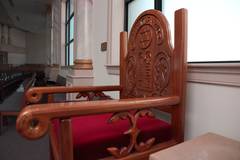Lifecycle Events
In times of joy and in times of sadness, Magen David is a place of warmth and understanding. We are a resource for all you wish to accomplish, and an aid in times of difficulty or stress.
Life cycle events may be coordinated through the office of our executive director, Andrea Choobineh at office@magendavidsepharic.org .
Brit Milah


Circumcision (brit milah) is an outward physical sign of the covenant G_d made with Abraham four thousand years ago. The ritual is performed by a mohel on the eighth day of a boy’s life. The baby is held by the sandak, usually a grandfather or a great uncle, who is seated in the ornate and traditional “Elijah’s chair”. The ceremony admits the baby boy to membership in the Jewish people and symbolizes his parents' commitment to raise their son with Jewish awareness and sensitivity. The brit may be held at home, but members often prefer the the inspiration of the MDSC sanctuary.
Baby Naming

In Sephardic custom, naming children after living relatives (as well as deceased ones) is encouraged. Sephardi families tend to name the eldest son after the paternal grandfather and the eldest daughter after the paternal grandmother. This tradition has its roots in the Torah. Among Sephardim, the ceremony of naming a daughter is called zeved habat, or “presentation of the daughter”. on this occasion, a special mi sheberach prayer is recited.
Pidyon Haben

In ancient times, the Israelites raised their first-born sons to enter the priesthood. Later, when only Levites and Cohenim were consecrated to divine service, the community initiated the pidyod haben ceremony, in which a father redeems his baby from the service commitment, paying equivalent of five shekels to a descendent of the Temple cohenim (the ritual is outlined in Mishnah tractate Bekhorot). The ceremony has been embellished throughout the centuries, and at MDSC, it often reflects the parents’ and grandparents’ heritage distant lands.
Bar Mitzvah

Shortly after his thirteenth birthday, on Shabbat, or at a Monday or Thursday morning service, a boy is called to the Torah for his first aliyah. The bar mitzvah reads the week’s haftarah, and we are proud to say that some of MDSC's young men have read the entire Torah portion as well. Friends and family members are honored with aliyot during the Torah reading. At the end of the service the celebrant presents his drash to the congregation. The family usually hosts a festive meal in the synagogue’s Sriqui Social Hall.
Bat Mitzvah

Sephardic sages embraced the idea that girls should study Torah and perform mitzvot, and many endorsed the idea of bat mitzvah. Hacham Ovadya Yosef suggests that a bat mitzvah encourages girls to perform the mitzvot to which they are obligated. Of the Baghdadi minhagim, the Ben Ish Hai wrote that when a girl turns twelve, she should wear her best clothing to the synagogue and recite the sheheheyanu. Rav Amram Aburbiya wrote that in Morocco a girl's Bat Mitzvah should be celebrated with a seuda mitzvah, during which the girl is encouraged to deliver a devar Torah.
Marriage

An MDSC wedding is a moving and joyous occasion at where all can participate in the happiness of the couple and their families. On the Shabbat prior to the wedding, the hattan may be honored with an aliyah and a special blessing. In common with Ashkenazi weddings, the ceremony is followed by a reception, and a week-long celebratory shevah berachot, at which friends and family enjoy meals with the couple and chant the traditional seven wedding blessings to wish them well.
Bereavement
The warmth and chesed of the community is never more apparent than when an MDSC member loses a loved one. Whether the shiva is observed at home or at the synagogue, all come together to comfort the mourners and to recite evening prayers.
The Chevra Kaddisha is a source of consolation and spiritual connectedness. Members attend to the deceased according to traditional Orthodox practice. For those sitting shiva at home, the community can provide siddurim, coordinate visitation and parking, and/or arrange minyan leadership.
Traditions of the various communities (e.g., Moroccan, Syrian, Iranian, European) influence the way a family passes through the shiva period. Some offer Turkish coffee to visitors. Some study Torah, Talmud, or Zohar throughout the week. It is not customary among Sephardim for visitors to bring food to a house of mourning, but those who wish to make the gesture (kosher certified foods only) are not discouraged.

Mourners may observe the sheloshim (ending of the first 30 days) at a regularly scheduled evening service.

